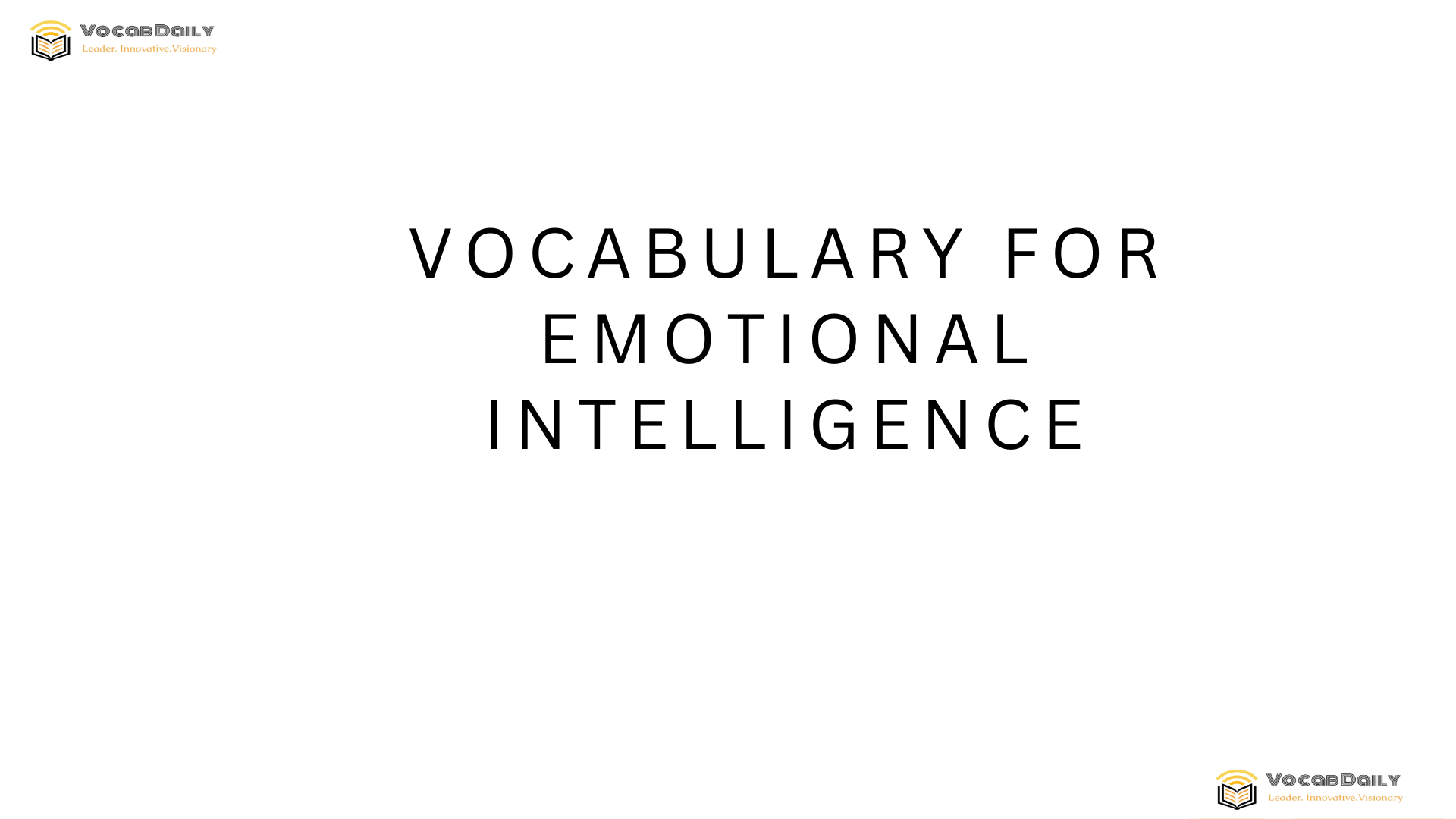Vocabulary for Emotional Intelligence
Emotional intelligence (EI) is an essential skill that helps us understand, use, and manage our emotions effectively in daily life. Having a rich vocabulary related to emotional intelligence can improve communication, relationships, and self-awareness. Whether you are learning English or simply want to expand your emotional vocabulary, mastering these words can be incredibly valuable. This article explores key emotional intelligence vocabulary terms, grouped to make learning easier and more practical.
Understanding Emotions
To develop emotional intelligence, it is important first to be familiar with words that describe different feelings. Recognizing and naming emotions helps with self-awareness and emotional regulation. Some essential vocabulary words related to understanding emotions include:
Emotion – A mental state that arises as a reaction to a situation, person, or event.
Mood – A longer-lasting emotional state, often less intense than an immediate emotion.
Feeling – The conscious experience of emotions, often a subjective response.
Empathy – The ability to understand and share the feelings of another person.
Self-awareness – Realizing your own emotions and how they affect your thoughts and behavior.
By mastering these terms, learners gain a better foundation to talk about and understand emotions clearly. Being able to express what you or others feel makes emotional intelligence more accessible.
Words for Emotional Expression
Expressing emotions in an appropriate and clear way is a key part of emotional intelligence. The following vocabulary will help learners describe how they or others express feelings:
Communicate – To share thoughts or feelings with others.
Express – To show emotions through words, facial expressions, or actions.
Assertive – Confidently expressing one’s opinions or feelings without being aggressive.
Vulnerability – The willingness to show one’s true emotions or weaknesses openly.
Nonverbal – Communication without words, such as body language, gestures, or facial expressions.
Understanding these words helps learners identify how people convey emotions and why clear emotional expression matters in relationships and social situations.
Vocabulary for Managing Emotions
One of the most important aspects of emotional intelligence is the ability to manage emotions effectively, especially in difficult situations. This skill involves self-control and regulation. Here are some vital terms related to managing emotions:
Regulation – The process of controlling or adjusting emotions.
Control – The ability to manage one’s feelings to prevent negative outcomes.
Resilience – The capacity to recover quickly from setbacks or stress.
Calm – A peaceful state of mind, free from agitation.
Patience – The ability to remain composed and tolerant, especially during challenges.
Knowing these words encourages learners to develop strategies for emotional balance, a crucial skill for both personal growth and professional success.
Social Awareness and Relationship Skills
Emotional intelligence goes beyond personal feelings and involves understanding others and building healthy relationships. Being socially aware and skilled helps in cooperation and empathy. Here are some important vocabulary words related to social awareness:
Empathy – The ability to feel and understand another person’s emotions.
Compassion – Showing kindness and concern for others’ suffering or difficulties.
Listening – Actively paying attention to what someone says.
Cooperation – Working together harmoniously toward a common goal.
Conflict resolution – The process of resolving disagreements peacefully.
Respect – A feeling of admiration for others, recognizing their worth and feelings.
Using this vocabulary enhances learners’ communication skills and helps create positive social environments.
Advanced Emotional Intelligence Terms
For learners who want to deepen their understanding of emotional intelligence, here are some advanced terms that describe more nuanced aspects of emotions and interpersonal interactions:
Self-regulation – The ability to manage disruptive emotions and impulses.
Emotional agility – The skill of adapting emotions to changing circumstances effectively.
Emotional literacy – Proficiency in recognizing, understanding, and using emotional information.
Interpersonal skills – The skills used to interact and communicate with others effectively.
Social competency – The ability to navigate social situations with confidence and skill.
Mindfulness – Paying attention to the present moment in a non-judgmental way, which helps in controlling emotions.
These vocabulary words can enrich learners’ English proficiency related to emotional intelligence, opening doors to improved self-awareness and social interaction.
Practical Tips to Use Emotional Intelligence Vocabulary
Learning new vocabulary can be challenging unless paired with practical use. Here are some tips for effectively applying emotional intelligence vocabulary in everyday conversations and writing:
- Practice labeling your emotions daily using new words to increase self-awareness.
- Use descriptive words when discussing feelings with friends, family, or colleagues.
- Incorporate emotional vocabulary into journaling to reflect on your experiences and emotional responses.
- Role-play conversations where you express emotions, listen empathetically, or resolve conflicts.
- Read stories or watch media that explore emotional situations and identify vocabulary used.
These approaches will not only improve vocabulary memorization but also help learners develop stronger emotional intelligence skills in real-life contexts.
Resources for Expanding Emotional Vocabulary
To continue growing your emotional intelligence vocabulary, it is helpful to use reliable resources. Many online platforms, language apps, and books offer targeted lessons on emotions and interpersonal skills. For example, you can find:
- Interactive quizzes and flashcards focused on emotional vocabulary.
- Video tutorials explaining emotional intelligence concepts and related words.
- Worksheets and exercises to practice describing emotions and social situations.
- Articles and blogs offering examples of emotional vocabulary in context.
- Discussion forums where learners share experiences using emotional language.
One recommended resource to explore is VocabDaily, which provides comprehensive vocabulary collections tailored for learners interested in enhancing their English skills in emotional intelligence and other important areas.
Developing a strong vocabulary for emotional intelligence not only improves language proficiency but also supports mental well-being and effective communication. By learning these key terms, you become better equipped to navigate your emotions and relationships with confidence and empathy.
Also check out VocabDaily workbook collections.

Leave a Reply